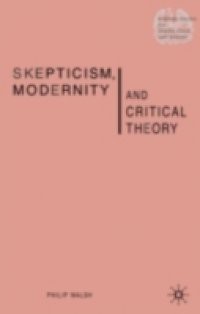It is well-established that the critical theory research paradigm developed in the Twentieth Century by Max Horkheimer, Theodor Adorno and others incorporated a distinctive theory of human knowledge that was strongly indebted to Hegel's critique of Kant. However, they were antagonistic to the systematic form in which Hegel presented his philosophy, and strongly influenced by Nietzsche's critique of the modern philosophical tradition. This book argues for the importance of understanding the relationship of critical theory to these key Nineteenth-Century thinkers in terms of the problem of skepticism. In so doing, it reconstructs and re-aligns the history of skepticism, exploring its meaning and significance within ancient and modern philosophy, and uncovers a major and hitherto under-explored line of continuity between the critical theory paradigm and post-Kantian philosophy.

